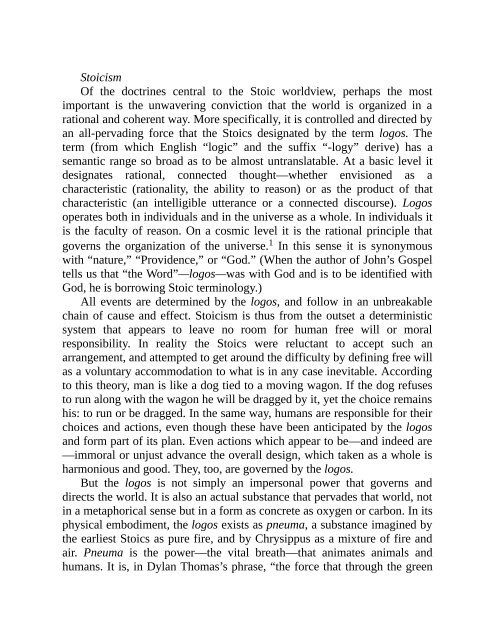9781945186240
You also want an ePaper? Increase the reach of your titles
YUMPU automatically turns print PDFs into web optimized ePapers that Google loves.
Stoicism<br />
Of the doctrines central to the Stoic worldview, perhaps the most<br />
important is the unwavering conviction that the world is organized in a<br />
rational and coherent way. More specifically, it is controlled and directed by<br />
an all-pervading force that the Stoics designated by the term logos. The<br />
term (from which English “logic” and the suffix “-logy” derive) has a<br />
semantic range so broad as to be almost untranslatable. At a basic level it<br />
designates rational, connected thought—whether envisioned as a<br />
characteristic (rationality, the ability to reason) or as the product of that<br />
characteristic (an intelligible utterance or a connected discourse). Logos<br />
operates both in individuals and in the universe as a whole. In individuals it<br />
is the faculty of reason. On a cosmic level it is the rational principle that<br />
governs the organization of the universe. 1 In this sense it is synonymous<br />
with “nature,” “Providence,” or “God.” (When the author of John’s Gospel<br />
tells us that “the Word”—logos—was with God and is to be identified with<br />
God, he is borrowing Stoic terminology.)<br />
All events are determined by the logos, and follow in an unbreakable<br />
chain of cause and effect. Stoicism is thus from the outset a deterministic<br />
system that appears to leave no room for human free will or moral<br />
responsibility. In reality the Stoics were reluctant to accept such an<br />
arrangement, and attempted to get around the difficulty by defining free will<br />
as a voluntary accommodation to what is in any case inevitable. According<br />
to this theory, man is like a dog tied to a moving wagon. If the dog refuses<br />
to run along with the wagon he will be dragged by it, yet the choice remains<br />
his: to run or be dragged. In the same way, humans are responsible for their<br />
choices and actions, even though these have been anticipated by the logos<br />
and form part of its plan. Even actions which appear to be—and indeed are<br />
—immoral or unjust advance the overall design, which taken as a whole is<br />
harmonious and good. They, too, are governed by the logos.<br />
But the logos is not simply an impersonal power that governs and<br />
directs the world. It is also an actual substance that pervades that world, not<br />
in a metaphorical sense but in a form as concrete as oxygen or carbon. In its<br />
physical embodiment, the logos exists as pneuma, a substance imagined by<br />
the earliest Stoics as pure fire, and by Chrysippus as a mixture of fire and<br />
air. Pneuma is the power—the vital breath—that animates animals and<br />
humans. It is, in Dylan Thomas’s phrase, “the force that through the green


